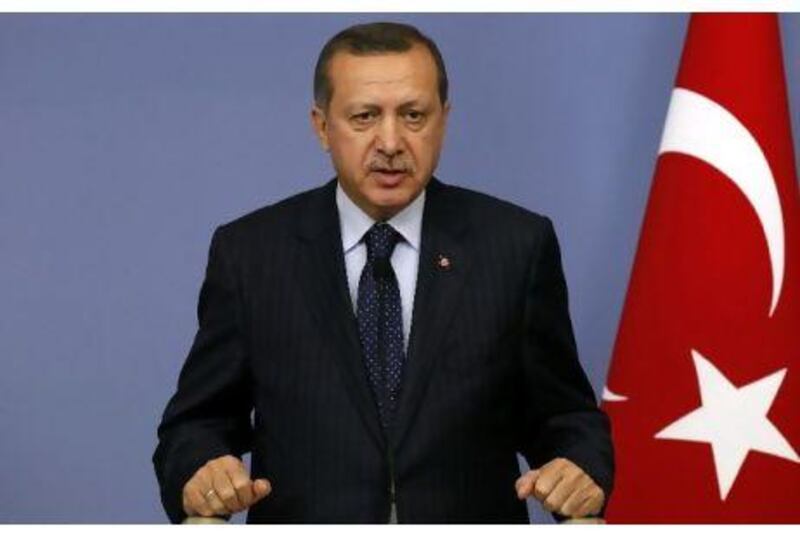ISTANBUL // When Gaby Levy, Israel's ambassador to Ankara, visited US diplomats in the Turkish capital last year, he offered a clear and candid explanation for the crisis in Turkish-Israeli relations: Recep Tayyip Erdogan, Turkey's prime minister, "simply hates Israel".
"He's a fundamentalist. He hates us religiously," Mr Levy was quoted as saying in a cable by the former US ambassador James Jeffrey to Washington in October 2009. Conversations with people inside and outside the Turkish government "tend to confirm Levy's thesis", the US ambassador added.
The confidential document, published by the WikiLeaks organisation this week, is one of about two dozen cables spanning the period from 2004 to February 2010 in which US diplomats in Turkey analysed Mr Erdogan, the Turkish government and Turkey's foreign policy. The cables reflect a struggle by the Americans to understand what drives Mr Erdogan, an important US ally in a critical region of the world, and show that the Turkish prime minister is still something of an enigma for the Americans after almost eight years in power.
In some cables, such as the one containing the report about the visit by Mr Levy, Mr Erdogan appears as an Islamist heading a possibly corrupt government whose ambition is far bigger than its abilities. But in other dispatches, the Turkish leader comes across as a reformer trying to widen democracy.
"Turkey is an extremely important ally in a dangerous region" and "more democratic and free than any other country in the Muslim world", Ross Wilson, the US ambassador at the time, wrote in a cable in March 2008. A cable from 2004 described Mr Erdogan as "the only partner capable of advancing toward the US vision of a successful, democratic Turkey integrated into Europe".
A court case in 2008 seeking a ban of Mr Erdogan's ruling Justice and Development Party, or AKP, was described as "the revenge of an unelected and unaccountable bureaucracy against Erdogan and popular democracy" in one cable. After the strictly secular Turkish military threatened to topple the AKP in April 2007, a high-ranking officer told the Americans that the generals "easily could have sent tanks rolling in the streets".
Before the parliamentary elections in July 2007, which the AKP went on to win with a landslide, US diplomats described efforts by the military "to make the AKP government appear weak on security" and "encourage undecided voters to turn to 'tougher' pro-secular parties".
Mr Erdogan is seen as a workaholic and a stubborn politician with autocratic tendencies and "street-fighter instincts" who inspires strong loyalty and "demands perfection from himself and from those around him". One of Mr Erdogan's strengths is that he is "very skilled and influential in direct personal relationships, which he works to cultivate with foreign leaders", US diplomats wrote in 2007.
The cables also reflected doubts of the US diplomats about Mr Erdogan.
Hinting at possible corruption, one message accused him of holding eight different Swiss bank accounts.
The prime minister had an "unbridled ambition stemming from the belief God has anointed him to lead Turkey" and a "hunger for absolute power and for the material benefits of power", diplomats wrote. At the same time, he lacked vision and "analytic depth" and was under "Islamist influences", especially by Ahmet Davutoglu, a former close aide and today's foreign minister. One cable quotes Vecdi Gonul, the Turkish defence minister, as saying Mr Davutoglu was "exceptionally dangerous" in this respect. Two years ago, US diplomats wrote that the "jury is out" on whether Mr Erdogan has a secret Islamist agenda.
In foreign affairs, US cables reveal Washington's unease about Turkey's policy towards Iran. The Americans were angry when Mr Erdogan said western fears of a secret Iranian programme to build a nuclear bomb were only "gossip".
Ankara's foreign policy has triggered concerns in the West that Turkey may be about to turn away from the West, but US diplomats disagree. "Does all this mean that the country is becoming more focused on the Islamist world and its Muslim tradition in its foreign policy? Absolutely," the memo from January this year read. "Does it mean that it is 'abandoning' or wants to abandon its traditional Western orientation and willingness to cooperate with us? Absolutely not."
[ tseibert@thenational.ae ]






